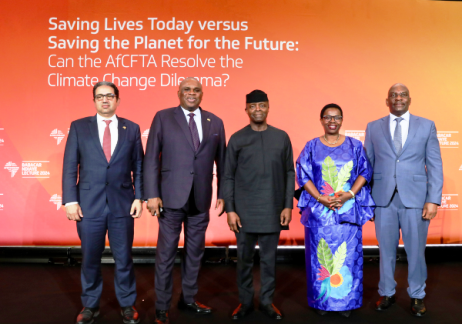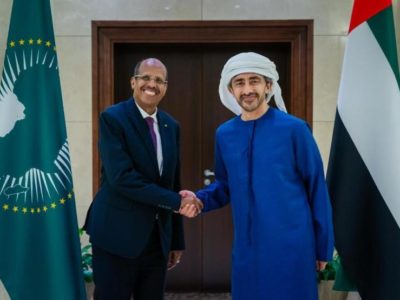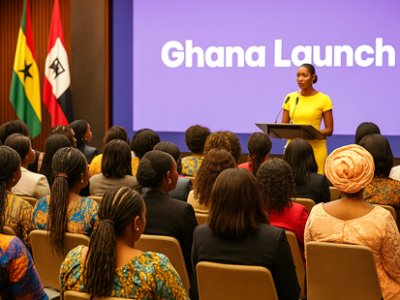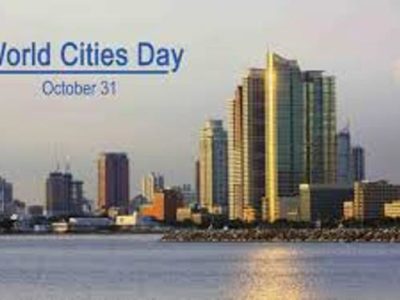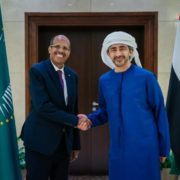The recent 8th Babacar Ndiaye Lecture, held in Washington, D.C., focused on the pressing challenge for African nations to balance short-term development needs with long-term climate goals. With the theme, “Saving Lives Today versus Saving the Planet for the Future: Can the AfCFTA Resolve the Climate Change Dilemma?”, the event explored how the African Continental Free Trade Area (AfCFTA) could support sustainable growth and position Africa as a global leader in the green economy.
A distinguished audience of policymakers, academics, financial experts, and climate advocates convened to discuss how AfCFTA, Africa’s most ambitious trade initiative, can serve as a pathway to reduce emissions and drive regional economic progress.
In his opening remarks, H.E. Professor Benedict Oramah, President of Afreximbank Group, commemorated Dr. Babacar Ndiaye, emphasizing his concern for the climate crisis and its specific impacts on Africa. Professor Oramah shared that Ndiaye warned of climate change as “the greatest threat to development, especially in Africa, where millions depend on the environment for survival.”
Oramah further emphasized that while global climate discussions focus heavily on emissions reduction, calls for Africa to “decarbonize before it even carbonizes” threaten socio-economic progress for a continent rich in gas and with 600 million people lacking access to electricity.
Professor Yemi Osinbajo, Former Vice President of Nigeria, delivered a keynote titled “Sustainable Infrastructure for Africa’s Future: Harnessing Innovation and Partnerships,” championing AfCFTA’s potential to revolutionize Africa’s trade ecosystem while reducing carbon footprints. He noted that 42% of African countries have introduced laws preventing the export of raw minerals, fostering local processing, job creation, and revenue generation within the continent.
Osinbajo highlighted the environmental and economic advantages of reducing dependence on export-led raw material processing. He explained how the current cycle of exporting raw materials for overseas processing, only to re-import finished products, drives up emissions. By promoting intra-African trade and local value addition, AfCFTA can significantly reduce carbon emissions across Africa.
Citing a study by the Economic Commission for Africa and CEPII, Osinbajo shared that AfCFTA implementation could boost intra-African trade by 35% by 2045, with a negligible increase in greenhouse gas emissions. With renewable energy integration, emissions could be further minimized. He referenced Guinea’s vast bauxite reserves, noting that processing bauxite into aluminum domestically with renewable energy could save 335 million tonnes of CO2e annually, create 280,000 jobs, and generate an additional $37 billion in revenue.
Studies like the 2021 Bloomberg report for the African Development Bank highlight Africa’s competitive edge in green production. It found that producing battery precursors in the Democratic Republic of Congo (DRC) is three times cheaper than in the U.S., EU, or China. By using renewables for production, Africa’s abundant resources, such as lithium and cobalt, could empower its economy while reducing emissions.
Prof. Osinbajo remarked, “The AfCFTA enables African nations to add value domestically and trade beneficially, leveraging national advantages while reducing carbon dependency.”
H.E. Dr. Rania A. Al-Mashat, Egypt’s Minister for Planning, underscored Africa’s minimal carbon footprint yet significant climate financing burden. She stressed the need for international cooperation to help Africa address climate-related development challenges, including food security, water access, and energy stability.
In her Goodwill Message, Ms. Amina J. Mohammed, UN Deputy Secretary-General, warned of the narrowing window to avert climate disaster. She called for affordable financing solutions, emphasizing that renewable energy could rapidly bolster Africa’s economies and improve living conditions for over 600 million Africans without electricity. Mohammed also highlighted the need for inclusive policies that prioritize youth and women in building climate-resilient economies.
The Babacar Ndiaye Lecture reinforced Afreximbank’s commitment to financing sustainable infrastructure and advancing AfCFTA’s potential for climate-positive growth across Africa.

